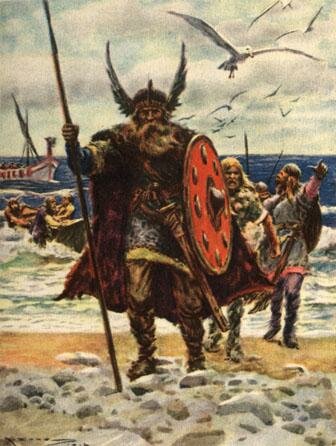Top 10 Villains in the Bible
Suggested by SMSFew books have done more to influence and inspire humanity than the Bible. As a collection of writings spanning 5,000 years of history, the Bible features some of the most iconic figures of purity and depravity ever imagined. Historical evidence exists for some and not for others, but regardless of their historicity, the people of the Bible have existed for centuries on the page and in the minds of billions of people all over the world. Often known for its violence as much as its message of morality, the Bible is filled with characters who seem to epitomize evil. The severity of their crimes may seem to evolve – from genocide and idol worship to betrayal and hypocrisy – but the prophets and writers of the Bible treat them as equally heinous. Here are 10 of the most reviled villains of the Bible, then and now.
10. Jezebel

Jezebel was a pagan princess who married the Israelite king Ahab. During their rule, they not only allowed worship of the pagan god Baal, but they even rewarded it with royal patronage. As an “outsider,” Jezebel is reviled for influencing Ahab and orchestrating a leniency toward paganism from behind the throne. After Ahab died, his sons by Jezebel ascended the throne, which further alienated and infuriated the prophet Elisha, who had another individual, Jehu, anointed as the rightful king. Jehu confronted Jezebel and had her court officials kill her by throwing her out of a window to be devoured by dogs. Shortly before her death, she had dressed in fine clothing and put makeup on, which has led some to denigrate cosmetics and associate them with promiscuous pagans or prostitutes.
Today, the name Jezebel has come to be associated with false prophets and “fallen” women, which could mean either promiscuous or controlling. Jezebel’s influence on popular culture is undeniable, dating back as far as 1880 and including the famous 1938 film starring Bette Davis.
9. Nebuchadnezzar

In the Bible, Babylon is synonymous with godlessness, and Nebuchadnezzar is one of the most famous of the Babylonian kings. He conquered the Israelites, sent them into exile, and destroyed their temple. Nebuchadnezzar features prominently in the Book of Daniel, since it’s Daniel who interprets the king’s dreams. His pride, violence, and oppressive rule have all made him a strong opponent to the ancient Israelites. His pride at his conquests and accomplishments were so severe that he was specifically humbled by God when he went insane and lived in the wilderness for seven years before regaining his sanity and praising God. His pride, in fact, was so legendary that some passages in the prophetic books of the Bible have been alternately interpreted as referencing Nebuchadnezzar and Lucifer.
8. Cain

Cain and Abel were the sons of Adam and Eve who embodied sibling rivalry. Cain farmed crops while Abel raised livestock. As required by God, the two brothers made sacrifices to atone for their sins – Cain from his crop and Abel from his animals. Abel sacrificed the best of his flock, the firstborn and the fattest. Cain, on the other hand, wanted to keep the best of his harvest and refused to sacrifice his best crop. God, though, only wanted the best, and he rejected Cain’s sacrifice. Enraged, Cain blamed his brother for showing him up. He claimed Abel had an advantage, being a shepherd and having the finest, fattest livestock to sacrifice. In his anger, he murdered Abel and buried him in the field. God later questioned Cain about Abel’s whereabouts, and Cain uttered the famous line, “Am I my brother’s keeper?” God punished Cain by banishing him. Cain complained that anyone who saw him would kill him, so God marked him and declared that anyone who killed Cain would suffer at the hands of God. As the Bible’s first murderer, Cain not only killed his brother, but he did so out of jealousy and then pretended not to know anything about it.
7. The Pharaohs

The end of Genesis and through Exodus, the Bible recounts the story of the Israelites’ capture and enslavement to the Egyptians. The Bible states the period of slavery lasted around 400 years, which clearly means that more than one Pharaoh ruled during that time. The Bible doesn’t mention the Pharaohs by name and doesn’t give enough information for scholars to say for sure who they would’ve been. Regardless of historical precision, in the minds of many, and in the tone of the Bible, the Pharaohs all blend into a singular notion of “Pharaoh,” who was responsible for one of the darkest periods in Israelite history.
The particular Pharaoh at the time of the Exodus, though, who chased after Moses and the Israelites, assumes most of the villainy. He fiercely opposed Moses, even in the face of the plagues that were inflicted upon the Egyptians. His relentless pride makes him one of the more forceful villains of the Old Testament.
6. Herod the Great

Around the time of Jesus’s birth, the three Magi – or “wise men” – who would later visit Mary and Joseph with gifts, had revealed to Herod the Great that a child was to be born in Bethlehem who would be King of the Jews. Herod ruled Judea for the Roman empire at the time, and all talk about a future king stirred up his jealousy. To protect his throne, he ordered that all male children up to the age of two in Bethlehem be killed. Scholars disagree on the number of children killed under this order. (In fact, the very event itself is disputed.) However, many Christians consider the children to be the first Christian martyrs.
The widespread infanticide didn’t have the desired effect, as Mary and Joseph had been warned by an angel to leave the city. The young family fled for Egypt and stayed there until Herod died. The mass murders are said to fulfill the prophet Jeremiah’s words, “A voice is heard in Ramah, weeping and great mourning, Rachel weeping for her children and refusing to be comforted, because they are no more.”
5. Pontius Pilate

The Roman prefect who oversaw Jesus’s crucifixion was named Pontius Pilate. Although he did not crusade for Jesus’s death, his inaction has garnered him plenty of ire. The religious leaders who felt threatened by the power and influence Jesus had demonstrated wanted him dead. They secretly questioned him at night, and when Jesus refused to play their game, they branded him as a criminal and took him to Pilate for judging. To his credit, Pilate seemed to see that the charges were likely trumped up, but his fear of inciting a mob, who now wanted Jesus’s blood, made him give in to the religious leaders and authorize the execution.
The Bible portrays Pilate as cowardly and irresponsible for allowing the mob to dictate his actions. He had the power to save Jesus, but he chose to ignore what seemed to be his better instincts and “wash his hands” of the matter.
4. Pharisees

Throughout the Gospels, we see Jesus butting heads with the Pharisees. At the time, the Pharisees were a religious sect vying for power among the people. Along with other sects, like the Sadducees, the Pharisees intermixed wealth, political power, and religion, often to the detriment of the common people. Although Jesus opposes leaders from all the oppressive sects, he takes special aim at the Pharisees. They have become the image of hypocrisy and superficial religion.
The Pharisees had a reputation for enforcing a set of religious rules and demanding a degree of morality that no one, including themselves, could ever achieve. When it suited them, they held people to the letter of the law, displaying no compassion or capacity to forgive. They acted out their devotion in public, for all to see, and foisted the burden of sin on everyone else. They dominated the high priest positions.
Jesus entered the scene as a rule breaker, in their eyes. His disciples performed miracles on the Sabbath. He dined with sinners. He forgave adulteresses. He mingled with prostitutes. The Pharisees repeatedly tried to trick him into breaking the law, but in the end, they couldn’t overcome Jesus’s popular appeal. In one Gospel story after another, Jesus focuses his anger on the actions of the Pharisees, calling them vipers and false prophets.
3. Goliath

The most formidable and fearsome villain in the Bible might be Goliath. The Philistine giant stood at least six feet nine inches tall, and may have been well over nine feet tall, according to later manuscripts. His face-to-face battle with the young David is still the most enduring underdog stories in history.
In the story, the Israelites and the Philistines were locked in battle. Twice a day for 40 days, Goliath stepped out and challenged anyone from among the Israelites to fight him one-on-one, with the winner of that fight deciding the outcome of the battle. The Israelites were too scared, and the standoff continued. After 40 days of Goliath’s taunting, David, who was just delivering food for his brothers, heard Goliath’s challenge and heard that the Israelite king, Saul, had offered to reward anyone to could slay the giant, and accepted the challenge. Armed only with his sling and five rocks, David confronted Goliath, who was clad in his Philistine armor. David warned Goliath that God was on his side, then launched the rock that changed the battle.
Traditional translations have the rock hitting Goliath in the forehead, stopping the giant cold, and causing him to stumble forward. Scholars have struggled with this reading, considering that Goliath would’ve worn a helmet with a forehead covering. Any rock launched with so much power that it could break through the armor and Goliath’s skull would’ve made the giant fall backward, not forward. New interpretations state that the Hebrew words could actually mean that the rock slipped in behind the giant’s leg armor so that he couldn’t straighten his leg and fell.
Once Goliath hit the ground, David raced over, jumped on his back, and used Goliath’s sword to sever the giant’s head. Taking down the most famous giant of the Old Testament catapulted David into one of the most prominent roles of the Bible and cemented Goliath’s legacy as one of the most notorious villains.
2. The Serpent

The serpent is the first villain the Bible unveils. As the innocent Adam and Eve enjoyed their garden paradise in Eden, the serpent was setting the stage for what has been known as “The Fall.” Adam and Eve stand as symbols of humanity, pure of heart but easily deceived. God had warned the couple not to eat fruit from the Tree of the Knowledge of Good and Evil. They would die if they ate from that tree, God said. The serpent would have none of that. Finding Eve, the serpent directly contradicted the word of God and convinced Eve that eating the fruit of that tree would not kill her, but instead would make her like God. Persuaded, Eve took a bite, handed the fruit to Adam, and everything instantly changed.
Traditionally, the serpent is seen as a depiction of Lucifer, or Satan – God’s nemesis. Others see the serpent, which has a long history of symbolizing fertility, as representing sexual passions in the Eden story. Since Adam and Eve were apparently unaware of their nudity before eating from the apple, the serpent’s deception can be interpreted as signaling the start of sexual sin – something the Church has battled for centuries.
1. Judas
Judas Iscariot was one of the Twelve Apostles of Jesus. He handled the money that the Apostles acquired through their travels. In the Gospels’ retelling of Jesus’s arrest and crucifixion, Judas is commissioned with 30 pieces of silver to betray Jesus and identify him for the Roman officials. After the Passover meal Jesus shared with his Apostles – known as the Last Supper – the men traveled out to the Garden of Gethsemane. Roman soldiers arrived and Judas kissed Jesus to identify him for the soldiers. The arrest begins the narrative of Jesus’s secret interrogation, torture, and ultimate crucifixion. Judas was so overcome with guilt that he committed suicide by hanging himself from a tree.
Because of his betrayal, Judas’s name has become synonymous with treachery, so that calling someone a “Judas” immediately identifies that person as a traitor. Scholars differ on what Judas’s motive may have been, whether it was simply for the money or for some nobler cause. However, regardless of his intent, his betrayal of the man many considered to be a prophet and, later, the very son of God makes him one of the Bible’s most infamous villains. Not even his remorseful suicide has earned him a reprieve.











Thank you for your great post but I’m going to disagree with you on Judus, the There were scripts written by the another religious sect that didn’t get chosen to be in bible that tell a different story about him I firmly believe Judus didn’t really betray CHRIST